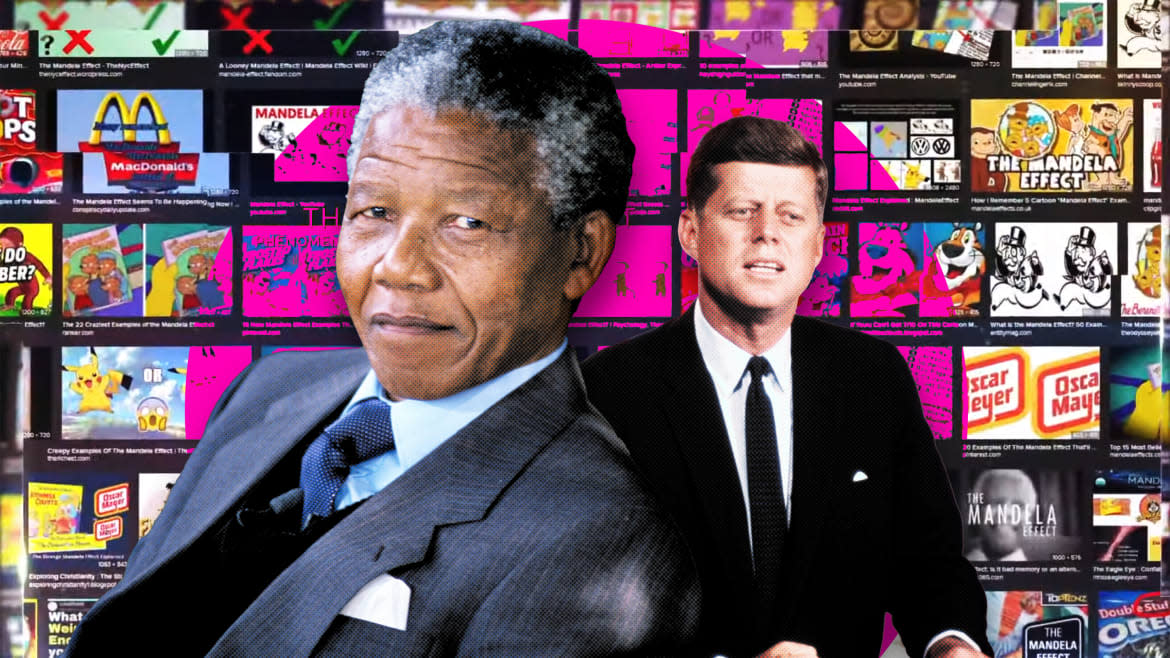The Mandela Effect: Are We Actually Living in a Computer Simulation?

Darth Vader does not say “Luke, I am your father” in The Empire Strikes Back. The ghosts in Field of Dreams do not command “If you build it, they will come.” Forrest Gump’s iconic line is not “Life is like a box of chocolates.” Mr. Rogers never opened his show by announcing that it’s “a beautiful day in the neighborhood.” These are facts, and yet if you disagree, you may be suffering from the “Mandela Effect,” a strange happening in which many people have the same wrong memory of a given cultural, political, or social detail.
Over the past few years, the Mandela Effect has inspired copious articles, message board threads, and online videos. Now, it receives the feature film treatment courtesy of The Mandela Effect Phenomenon, a documentary that not only formally resembles a conspiracy-minded YouTube post, but is about as reliable and convincing as one.
Premiering on VOD on July 9, The Mandela Effect Phenomenon is an examination of its seemingly bizarre subject via interviews with a grand total of two people, Sun Journal journalist Mark LaFlamme and author and “Mandela Effect researcher” Jacob Israel, neither of whom proves authoritative or persuasive. LaFlamme and Israel are the primary voices heard in this rambling and repetitive 90-minute affair from writer/director Robert Kiviat, who otherwise pads his runtime with cheesy 1990s-grade computer graphics and dramatic-recreation clips that look like they were taken from a workplace training video. The result is a film designed for those who enjoy their supernatural nonsense served with a healthy side of multiverse mumbo jumbo and topped off with a dash of paranoid The Matrix fantasy.
LaFlamme first learned about the Mandela Effect when he visited his mom’s home and discovered that a family photo had magically changed—whereas he had once stood on the right side of his father, he was now on the left. Recalling this formative moment, he says, “It creeps me out.” For Israel, revelation came in early 2015 during a trip to the Dollar Store, where he became certain that something was amiss with the logo on a Coca-Cola machine. Upon returning home, he verified that there was nothing wrong with what he’d seen; instead, it was his memory that was faulty. As he encountered additional similar discrepancies between what he thought he knew and what he saw—say, the design of the Volvo and Volkswagen logos—he came to believe that “there’s something going on here.”

Fred Rogers
The question isn’t whether something is going on, however, but what that something is. Before The Mandela Effect Phenomenon trots out its central theories, it spends its initial third laying out examples of the effect itself. Not only does “everyone” think that Darth Vader says “Luke, I am your father,” but so does James Earl Jones, who recites the incorrect line in an episode of Two and a Half Men! Introducing a segment about writers during his stint as host of the Academy Awards, David Letterman quotes “Life is like a box of chocolates!”
A clip montage illustrates that numerous people have erroneously referred to Sex and the City as “Sex in the City”—and knock-off merchandisers have made this faux pas as well! These particulars are reiterated multiple times, along with mentions about how everyone supposedly misspells “Oscar Mayer,” is unaware that the Ford logo has a curlicue on its “F,” and that Dolly, the girl who smiles at Jaws in Moonraker, once had braces in her big scene, but now does not!
“It just doesn’t seem to make much sense,” opines Israel about the Sex and the City confusion, but he may as well be talking about this documentary, which lurches about in search of a cogent hypothesis regarding the cause of this weirdness. Both LaFlamme and Israel discuss how CERN’s Large Hadron Collider may have caused our timeline to cross/mix with another multiverse timeline, thereby producing these incongruities. Israel also floats the notion that we could be living inside a giant computer program (i.e. “simulation theory”) à la The Matrix. As for who’s running the program—which might be using these inconsistencies to “test” us—Israel suggests it could be aliens, an artificial intelligence, or angels and demons.
The ‘Beverly Hills Cop’ Legacy Is More Problematic Than You Remember
Speaking of which, Israel routinely mentions scripture throughout the course of The Mandela Effect Phenomenon. Thus, it’s no surprise when, in latter passages, he ditches the Mandela Effect altogether in favor of warning about the “dark times” we’re living in, praising the inevitability of our “happy ending” (i.e. Jesus’ return), and decrying the Satanic elements found in, among other things, the Gotthard Tunnel, Travis Scott’s stage design, Megan Fox’s fondness for drinking blood, and Monster Energy’s branding—because, you see, the three claw marks that make up the logo’s “M” are really the Hebrew numbers for 6, making it a 666 that matches the beverage’s tagline, “Unleash the Beast.”
Down the lunatic rabbit hole goes The Mandela Effect Phenomenon, substituting logic and common sense for wild speculation. There’s a drinking game to be created out of how many times Israel calls something “disturbing.” LaFlamme, on the other hand, defends his memory with intense conviction, all while insulting The Empire Strikes Back screenwriters Leigh Brackett and Lawrence Kasdan by proclaiming—with regards to the aforementioned line, which is actually, “No, I am your father”—“I don't understand why people would still remember that line if it was written in such a lazy, sloppy way.”
Though LaFlamme and Israel pay lip service to the possibility that this is all just a function of communal misremembering, both believe the answer must be more spectacular. Their arguments hold little water, however, and not just because LaFlamme twice makes the same type of innocent memory-related mistake—referencing “the Zapruder films” and calling the famous physicist Stephen “Hawkings”—that he chalks up to the paranormal. Crafted like a long-form rant that routinely doubles back on itself to rehash choice talking points, Kiviat’s documentary is an unintentionally hilarious example of conspiratorial thinking. LaFlamme may wrongly assume that a negative review such as this is par for the course for the “superficial” mainstream media, yet he’s correct about one thing: much of what he and Israel have to say is “too cuckoo” to be taken seriously.
Get the Daily Beast's biggest scoops and scandals delivered right to your inbox. Sign up now.
Stay informed and gain unlimited access to the Daily Beast's unmatched reporting. Subscribe now.


